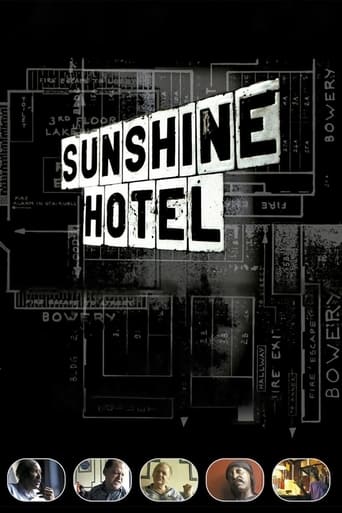BabyIDontCareMitchum
I'm in the middle of watching it now.I have a Question about the garden but when I tried to ask this as a FAQ it did not have any option there to post a question. I'm trying to find out what was going on it the section when the errand runner man stops at the nice public garden where he stops at every day for years and some nasty woman in a big hat chases him out literally and very rudely. What is this garden and why would someone who is a docent there act that way to someone? It is very puzzling to us and is not explained at all in the film (as they just have the men speak for themselves with no narration). As for the film as a whole... it's Interesting...never saw another doc on this subject and have read little on it. The men have many similarities to the street people homeless we see today in the big cities but these guys pay for a very basic roof over their head where they can drink or take drugs or deal with whatever mental issues they have. In homeless shelters you can't drink or take drugs and be right there doing so like you can at a flop like this. It's interesting to see the differences between living like this and being a street person (homeless) or being say in prison... as I've seen many documentaries on men in both of those situations.
And seeing this makes one appreciate your own life more and your own living situation and life style.
blumdeluxe
"Sunshine Hotel" tells the story of an old hotel building in New York City, where tiny rooms are being rented to people with minimal income and how they interact in an environment full of addiction, violence and broken dreams.This film is another great example how different circumstances can lead into a downwards spirale that is ultimately hard to escape. It shows that poverty has in some cases nothing to do with the abilities or the personality of a person and invites the viewers to be more open-minded and tolerant towards people left behind by the society. At the same time it adds to the picture of the city and lifts the curtain to a world that most likely will be new to most viewers. At some points it can be hard for someone who isn't a native english speaker to understand everything, but apart from that there is much to explore.All in all this is a well-made documentary with a very interesting topic that tells some of the stories of the city that we tend to forget about most of the time.
Leofish
What an incredible film, especially for a documentary. This reflection on a seemingly hopeless flophouse and the worn-out, tired men who live in it is stunning in the stark reality it gives the viewer, and the poor residents it reveals are truly fascinating people. They are people who anyone can relate to, who had a dream that didn't quite come to fruition, who had a terrible experience with prejudice or lost love, people who seem like they've had the deck stacked against them from the start. This movie is essential for a viewer who wants to see a movie about the lost dreams of an American city and American lives. It's tracing of the infamous Bowery neighborhood from it's glory days to it's present depressed melancholy environment show a changing America, but an America that has always had nothing but contempt for the losers in life. This film shows how those "losers" deserve sympathy from those less blessed in life--everyone knows someone like them, someone who just didn't get any breaks. There are some truly haunting shots, from a post-September 11th perspective, that show the World Trade Center buildings towering over the bleak city street on which the flophouse resides, but the real lesson in this movie is how our system ruins the lives of good people, like the elderly black Army veteran recounting his terrifying experience in the Jim Crow South during the 1950s, or the charming man who recounts his hopelessness and lack of confidence with women in a frank, honest manner that would have brought a less hardened man to tears. This film is sad and beautiful and unsparing in its truth, and it is an extraordinary movie.
